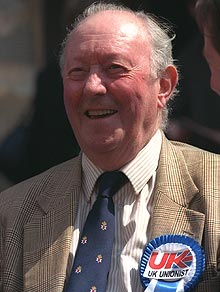Conor Cruise O’Brien
| Conor Cruise O'Brien | |
|---|---|

Cruise O'Brien pictured when he was a member of the UKUP
|
|
| Senator | |
|
In office 27 October 1977 – 13 June 1979 |
|
| Constituency | University of Dublin |
| Minister for Posts and Telegraphs | |
|
In office 14 March 1973 – 5 July 1977 |
|
| Teachta Dála | |
|
In office 18 June 1969 – 16 June 1977 |
|
| Constituency | Dublin North-East |
| MEP for Ireland | |
|
In office 1 January 1973 – March 1973 |
|
| Personal details | |
| Born |
3 November 1917 Dublin, Ireland |
| Died | 18 December 2008 (aged 91) |
| Nationality | Irish |
| Political party | Labour Party |
| Other political affiliations |
UK Unionist Party |
| Spouse(s) | Christine Foster (m.1939–div.1959) Máire Mhac an tSaoi (m.1962–2008) |
| Children | Donal Cruise O'Brien (by Christine Foster) Fedelma Cruise O'Brien (by Christine Foster) Kate Cruise O'Brien (by Christine Foster) Patrick Cruise O'Brien (adopted with Máire Mhac an tSaoi) Margaret Cruise O'Brien (adopted with Máire Mhac an tSaoi) |
| Alma mater | Trinity College Dublin |
| Occupation | Journalist |
|
|
Conor Cruise O'Brien (3 November 1917 – 18 December 2008) often nicknamed "The Cruiser", was an Irish politician, writer, historian and academic. His opinion on the role of Britain in Ireland and in Northern Ireland changed during the 1970s, in response to the outbreak of The Troubles. He saw opposing nationalist and unionist traditions as irreconcilable and switched from a nationalist to a unionist view of Irish politics and history. O'Brien's outlook was always radical and the positions he took were seldom orthodox. He summarised his position as intending "to administer an electric shock to the Irish psyche". Internationally, he opposed in person the African National Congress's academic boycott of the apartheid regime in South Africa. These views contrasted with those he espoused during the 1950s and 1960s.
During his career as a civil servant O'Brien worked on the government's anti-partition campaign. At the 1969 general election he was elected to Ireland's parliament, as a Labour Party TD for Dublin North-East, and became a Minister between 1973 and 1977. He was also the Labour Party's spokesman on Northern Ireland during those years. He was later known primarily as an author and as a columnist for the Irish Independent.
Cruise O'Brien was born in Dublin to Francis ("Frank") Cruise O'Brien and Kathleen Sheehy. Frank was a journalist with the Freeman's Journal and Irish Independent newspapers, and had edited an essay written 50 years earlier by William Lecky concerning the influence of the clergy on Irish politics. Kathleen was an Irish language teacher. She was the daughter of David Sheehy, a member of the Irish Parliamentary Party and organiser of the Irish National Land League. She had two sisters, both of whom lost their husbands in 1916. Hanna's husband, the well-known pacifist and supporter of women's suffrage Francis Sheehy-Skeffington, was executed by firing squad on the orders of Captain J.C Bowen Colthurst during the 1916 Easter Rising. Soon afterwards Mary's husband, Thomas Kettle, an officer of the Royal Dublin Fusiliers, was killed during the Battle of the Somme. These three women, Hanna and Kathleen in particular, were a major influence on O'Brien's upbringing alongside Hanna's son, Owen Sheehy-Skeffington.
...
Wikipedia
